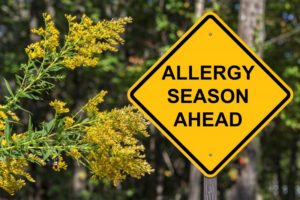
The Centers for Disease Control and Prevention estimates that 60 million people each year in the United States are affected by seasonal allergies caused by pollen and plant blooms. In September, Ragweed pollen is one of the most common things that triggers these reactions, and what many people don’t realize is that in addition to affecting your sinuses, seasonal allergies can also impact your oral health. Read on to learn about three ways that sniffling, headaches, and scratchy throats as a result of seasonal pollinating plants can impact your teeth and gums.
Tooth Pain & Sinus Pain
Seasonal allergies typically affect the sinuses, causing them to feel incredibly inflamed, filled with fluid, and uncomfortable due to all of the pollen and dust in the air. A side-effect of this problem that many people don’t realize is tooth pain. The largest sinuses in your face, which are the maxillary sinuses located within your cheek-area, can become filled with mucus and fluid, causing pressure to weigh down on the roots of the molars in your upper arch of teeth. The result is dental sensitivity and pain whenever you sit, stand, or lay down.
Dry Mouth from Mouth Breathing
If your allergies cause your nose to become stuffy, then you may not realize it, but you likely breathe out of your mouth throughout most of the season. This can cause you to develop dry mouth, and because of your decreased saliva production, you may be at a higher risk of developing cavities, gum disease, and bad breath. When harmful oral bacteria aren’t naturally washed away by your saliva, they’ll hang around and produce waste in the form of sulfur-smelling acids that can erode your enamel and toxins that can cause the early signs of gum disease.
Postnasal Drip & Sore Throats
Another common oral health-related problem as a result of seasonal allergies is postnasal drip, which is when fluid drains from the nose into the throat, causing congestion and coughing, as well as a sore throat. It can result in bad breath that brushing won’t take care of because it originated in the throat region.
What Can You Do to Protect Your Smile from Seasonal Allergies?
Here are a few suggestions to help keep your oral health on the right track as you’re battling seasonal allergies:
- Stay hydrated by drinking plenty of water. This will help combat dry mouth and flush away excess mucus.
- Dissolve a tablespoon of salt water into a glass of lukewarm water and gargle and spit. This will help remove mucus from your sinuses and relieve seasonal allergy-related symptoms like thumping headaches. It will also help minimize the effect of harmful oral bacteria on your mouth.
- Keep up with your oral hygiene routine, even if you don’t feel up to it.
- Take allergy medication suggested by your doctor, or talk to them about other options to help combat your allergies.
- Speak with your dentist about whether they have any helpful recommendations on how to cutdown on oral health issues due to allergies.
By protecting your smile while treating your allergies, you’ll be able to minimize signs of both problems and feel a bit better than you normally would.
About the Author
Dr. Rafiq Hirji has over 10 years of experience treating patients of all ages, from children to adults. He provides comprehensive dentistry, but his goal is to help his patients maintain healthy smiles for a lifetime with thorough, attentive preventive care. To learn more about how seasonal allergies can impact the health of your teeth and gums, schedule a checkup and cleaning by visiting Daily Smiles MacArthur’s website or call 972-546-4114.
